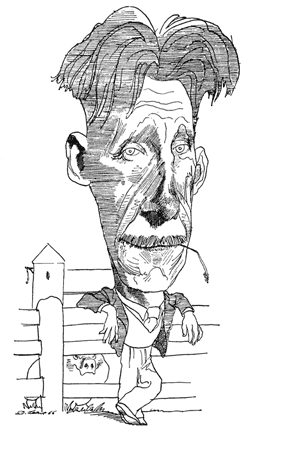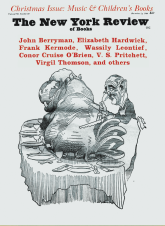The eccentric, the crank, and the thorn in the flesh turn up regularly in British life and in war many of them come into their own. This was certainly true of George Orwell, who, in addition, was two persons: the suppressed figure of Eric Blair, once a police officer in Burma, old Etonian, and poor Scot, briefly soldier of misfortune in the Spanish Civil War; and George Orwell, amateur outcast, Bohemian, and journalist who, as Herbert Read said, raised journalism to the dignity of literature. He was a familiar London figure in BBC circles during World War II—he was in charge of broadcasts to India—in the Soho pubs, the offices of Horizon, and in many districts where poor writers settled in those hungry and seedy times. There is a considerable Orwell anecdotage. It was impossible to know such a complex, straying, and contradictory man well, but George Woodcock, who became a friend after the usual quarrel which established one with Orwell, gives a good account of his personal spell, and has written a very penetrating personal study.
Orwell looked, as Mr. Woodcock says, like Don Quixote and was haunted by his Sancho Panza; better still, like a “frayed sahib” in shabby jacket and corduroy and betraying his class by his insouciance. Tall and bony, the face lined by pain, eyes that stared out of their caves, he looked far away over one’s head as if seeking more discomfort and new indignations. He had a thin-lipped, hard mouth; his general bleakness was relieved by sudden smiles and by a vigorous shock of wiry hair en brosse. The voice had the lazy, almost spiritless, Cockney drawl, but had something like a rusty edge to it that suggested trouble and had been used to authority. He seemed more at home than we were in the bleak noman’s-land that war creates in the mind and in life in general. Among my encounters with him three stand out. I once went back to a half-empty flat he had taken on the top floor of a high and once expensive block of flats in St. John’s Wood. He pointed out that the building was half empty because of the Blitz, the rents had dropped low, and that it was lucky to be able to live close to the roof because you could get out quickly to deal with the fire-bombs. He seemed to want to live as near to a bomb as possible. Another time we stood for a long time in a doorway off Piccadilly while he told me about the advantage of keeping goats in the country with full details of cost and yield—for he was a born small holder and liked manual work. At the BBC he spent his evenings in a parttime job making small parts for aircraft. He tried to get me to bring my family and join him in the disastrous migration to the island of Jura. The attraction of the island seemed to be that it was out of touch with the mainland for long periods because of storms, that one would be scrabbling along the rocks and shores for food and fuel, and would be free of the competition of modern totalitarianism. We were eating and drinking expensively and well in Percy Street at the time, for a genial Sancho Panza would unexpectedly take over from the gaunt Quixote. One of the things that made him hate industrial capitalism was that it fed its people so badly on the ersatz and had so demoralized them that they could not cook. But, at the same time, he would stuff his pipe with cheap shag bought at miserable little shops and drink strong tea out of its saucer—in the romantic belief that this was what the decent British workman did, and point out the moral advantages of dossing down in “working-class discomfort.”
THESE HABITS led to charges of affectation. Certainly there was a streak of moral vanity in Orwell; but, as Mr. Woodcock says, the charge of affectation is superficial. There was an element of inverted dandyism in Orwell and it is indicated by his surprising admiration for Oscar Wilde and especially for Dorian Gray. Orwell was not at all interested in homosexuality but he was fascinated by Dorian’s double personality and his impulse to go native in his own country. The other statement—made at the time of his death—that his opting out of our kind of society, his eagerness to suffer—as in the harsh experience in Jura—was suicidal, for he was already tubercular. It is true that there seemed to be a core of exhausted indifference or something like a gambler’s neutrality of spirit in him; but the belief that one could find the comely, natural life in primitive surroundings among simple people was central to him. “Comeliness” was one of his favorite words. He certainly would not have taken the adopted son, whom he adored, on an expedition directed to a suicide. We cannot know much about this because Orwell insisted that no biography should be written about him. He was secretive and liked to keep his friends and his life in different compartments.
Advertisement
It is well known that Orwell’s political conscience and interests were precocious and that his ideas grew out of action. He was closer to Camus, Silone, and Koestler than he was to any English contemporaries who were not blind to Continental politics but hated to believe they were real. He had resigned from the Burmese police on principle, but unlike many romantic rebels, he respected the need for authority, as one can see in the passages where he defended Kipling. In many ways, the Radical was conservative—as English radials have often been. For him, Victorian colonialism and Victorian England were bad, but, at any rate, concealed a core of personal decency. This, he believed, would have little chance of surviving in our period of disintegration in which we were bent on saving ourselves through an authority that was impersonal, totalitarian, nonhuman, and dishonest. We were condemned to Newspeak.
ORWELL’S PICTURES of England are a mixture of sarcasm, pragmatism, and sentiment. One must treat his writings as one treats Shaw’s: collect the fragments of good sense. The Burmese experience led him to suppose, as Mr. Woodcock says, that the attitude of the colonial rulers to ruled was identical with the attitude of the English and European ruling class to its workers. They were out casts too and he sought to join them. This diagnosis was extravagant and his personal renunciation led him to meet outcasts only, the down-and-outs. In this he was as romantic as Dorian Gray. For the main body of the British working class have been respectable and self-respecting since the industrial revolution. They were educated by their unions. The class barrier was absolute on their side. Their obsession with sport, beer, gambling, and bad newspapers did not affect their tenacious political puritanism. They too, like Orwell—this is their one link with him—had a double mind; but they were not déclassés. In his slapdash book about English life, The Lion and the Unicorn, he made a tolerably good picture of the truculent and lazyminded English muddle.
The value of Mr. Woodcock’s study lies in the care with which he picks his way among Orwell’s self-contradictions and follows his progress from work to work. This is a difficult task, for Orwell was not one for organized abstract thought. He is as drastic but as variable as a Cobbett or a Dickens—even, it has lately struck me—as Carlyle. His essay on Dickens is about the best thing done by an English writer since Gissing. It is important to understand how seriously Orwell worked at finding a style that would reflect his attempt at a natural attitude to his subjects, his curious humor, and his realism. From the colored uncertainties and guesses of journalism, he advanced to a prose as clear as rain, Swift-like in passages of Homage to Catalonia and Animal Farm. Mr. Woodcock is very interesting on the links between the early Burmese Days (the work of liberation), the childhood passages in Coming Up for Air, and the fantasies in 1984; and in the sadistic images which crop up mysteriously. It is also instructive to see how his interest in the abuse of language grew from his work in the BBC. He was not a good novelist, but he was “in life” and an intrepid pamphleteer.
This Issue
December 15, 1966




